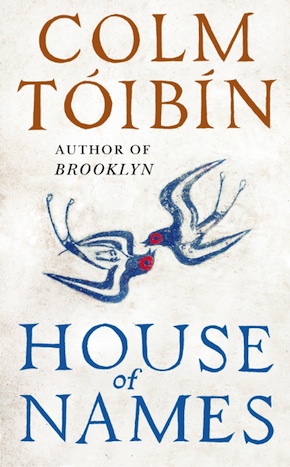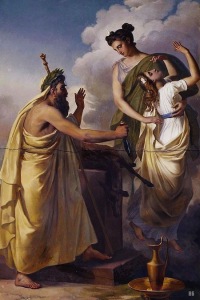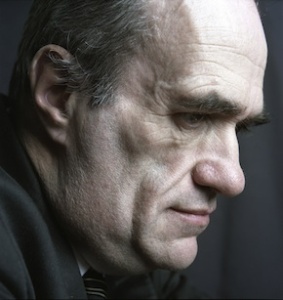Howling whispers
by Mika Provata-Carlone
“This isn’t just a captivating retelling; it’s a creative reanimation of these indelible characters who are still breathing down our necks across the millennia.” Washington Post
Aeschylus wrote the Oresteia at the age of 67, after a life that had included divine inspiration (he was advised by Dionysus in a dream that writing plays, rather than cultivating vineyards, might perhaps be his true calling), overwhelming and continuous political change in his native Athens, valour in battle during the Persian wars, fighting in both Marathon and Salamis, and a dramatic trial for allegedly revealing the secret rites of the Eleusinian mysteries. Dionysus had been far-sighted in his counsel: Aeschylus today defines for us the beginnings of the very genre of theatre and tragedy, he is our reference for its purpose and power not only as a cultural object and phenomenon, but especially for its critical role in creating the social fibre of Athens, the soul and conscience, the mind and ethos of the Athenians.
With a single stroke of genius (or thanks perhaps to a Dionysian whisper), Aeschylus transformed what was a ritual recital into passionate and gripping dramatic action: he introduced a second protagonist so there would be dialectic exchange and especially gritty conflict, placed the emphasis on plot and ideas, as well as on stagecraft, by making settings and theatrical machines, choreography and song a central part of the experience. Above all, he made dramatic language into a living, breathing organism, a thing of extraordinary beauty and sublime economy. His words, carefully selected for their weight in meaning and rhythm, their colours in sound and associations, tell stories that are complete worlds in themselves: worlds of human suffering and dignity, philosophical questioning and daring social experimentation. He wrote, we believe, the first trilogies, sustaining a plot across all three plays, inviting an engagement that demanded total immersion, empathy, identification.
A central part of Aeschylus’ brilliance, his strong, contemporary resonance, are the multiple facets of meaning and interpretation that he embeds in every single gesture and utterance. Of his 80+ plays, seven are in our hands today, and the Oresteia is the only trilogy that has survived, a harrowing tragic triptych of singular value: as a piece of radically innovative dramatic art, as a literary text, as an exploration of almost every human passion and emotion, as a scathing or guiding commentary on ethics, socio-politics, law and justice, human relations.
Tóibín seizes and absorbs the literary tradition, amplifying and distilling with staggering precision and steely vision. His novel is a crowded house of the dead, where ghostly voices incandesce.”
The Oresteia contains extremes of good and evil, devotion and betrayal, self-promoting hunger and visionary ambition, law as a retributive mechanism or as a system of social justice. It is the point of a terrible convergence between a war-driven past and a peace-seeking present, a past of human sacrifice, family-centred societies, aristocratic rule based on glory and entitlement, chthonic deities and a visceral matriarchy, which needs to change into a world of symbolic offerings and interpretation, civic integration, democracy, an enlightened Olympian metaphysics and a new society of reason and of men (as well as of new women). This is the bone and marrow of the play, as is the clash between an Eastern and a Western way of life, now transferred from the battlefields of Troy (or the courts of Darius and Xerxes) to the homes of the returning warriors and culturally bombarded, contemporary Greeks. Agamemnon returning triumphant with a train of rich spoils, slaves and a new consort, who is a prophetess and a princess, is no longer himself, but a projection of the Eastern ruler as described by Herodotus and as encountered only too recently on Greek soil: of many wives, capricious desires, a taste for excessive luxury that goes against the grain of the ‘measure’ and the ‘mean’ of the Greeks, and an authority that competes with that of the gods. By the end of the third play, all that and so much else will be drastically debunked.
In writing the Oresteia, Aeschylus bequeathed to those who came after him a hoard of gold. The challenge for any writer who takes his cue from him is to give it new life without making it look like a mere, sparkling trinket. Sophocles and Euripides, Seneca, Hofmannsthal and Eugene O’Neill, Giraudoux, Sartre and Marguerite Yourcenar succeeded in adding or revealing, with breathtaking genius of their own, electrifying new dimensions of the story of a husband and wife, a son and a daughter, which have earned their own immortality and legacy. With House of Names Colm Tóibín claims he too can do as much, creating a powerful, evocative chamber of echoes of his own.
Tóibín seems to seize and absorb the literary tradition, amplifying and distilling at the same time with staggering precision and steely vision. His novel is a crowded house of the dead, where ghostly voices incandesce alternately to tell their story. His Clytemnestra exudes Aeschylus and Yourcenar, his Agamemnon has the vital noise of a Homeric battle, his Mycenae lie under a cloud of Sartrean flies. He gives us an Electra that is an eerie match to Sophocles’ Antigone, an Aegisthus who kicks every preconception, psychological or dramatic, out of balance, and an Orestes who reflects all the ambiguity he is burdened with across his many afterlives. Tóibín’s narrative is transfused with nightmares beyond those of Tantalus, Atreus and their line: political cleansings, internecine strife, guerrilla tactics of gutting violence and ruthlessness, which come from his Irish childhood and the trauma of IRA fighting, and the failure of storytelling as an agent of healing. In House of Names, Tóibín also seeks a voice for that other Thyestean Feast, the Kingsmill massacre, “one of the most harrowing moments in the whole history of the harrowing of the heart in Northern Ireland”, in the words of Seamus Heaney.
House of Names has beautiful lyrical simplicity, even at its most stilling, chilling moments: Tóibín is an expert sculptor of sentences and sounds, creating curves and angles, reflexive surfaces, minor-key melodies that seem as natural and effortless as a breath or a sigh. He uses almost unsettling understatement and brutal juxtapositions instead of elaborate illustration to create not only visually disturbing tableaux of the successive, relentless acts of ‘just killing’, but especially to expose, in stark relief, the complex madness and the unyielding, human and fragile despair behind them. Even in his most shockingly evocative images, his choices are perfectly weighed, words are picked up with almost pitiless delicacy, demanding an osmotic reading. We are just as exposed, perused, understood, as the characters themselves. Tóibín spins poetry of breathless beauty and intensity, never compromising narrative sincerity, achieving a rare clarity and immediacy of meaning and experience.

The Sacrifice of Iphigeneia by Abel de Pojol, 1822–25. Musée national du Château de Fontainebleau/ Wikimedia Commons
His Clytemnestra looms ferociously gigantic and elusively brittle at the same time, able to speak pain as well as viciousness. It is impossible not to be in her heart and mind.”
This is a journey of thought and empathy, of collective memory and of stories that never age regardless of their primal antiquity. The challenge of the Oresteia as a story is how to talk about acts of horror and atrocious emotion without descending into cheap thrill, Grand Guignol, oozing blood and gore. House of Names succeeds in balancing entrancing storytelling with a deeper substance of meaning and purpose. Here, the emphasis is on the desolate, “the almost loneliness” that are Tóibín’s particular emotive forces, “the great deal of silence” in which he has said that he grew up. His Clytemnestra looms ferociously gigantic and elusively brittle at the same time, able to speak pain as well as viciousness. It is impossible not to be in her heart and mind when she says of Iphigeneia’s sacrifice, “Kill the innocent girl in return for a change in the wind. Take her out of the world, use a knife on her flesh to ensure that she would never again walk into a room or wake in the morning. Deprive the world of her grace.”
Clytemnestra is a stabbing, throbbing wound, as well as a howling scream that has been stifled, silenced, forbidden for too long. She is the one who had hoped and can no longer believe, but must forge a way nonetheless, a dislocation between moments in time, perspectives of reality, perceptions of life that translates into a larger disjunctiveness between the human sphere and the divine. What reigns is total silence, a very particular kind of emptiness, as though this dislocation has brought about the termination of meaning, and death has become the mere terminus of existence: “They have departed, the ones who oversaw death. They have gone and they will not be back.” For Clytemnestra, the dislocation is traced back to Agamemnon, whose ungodly act of sacrifice has killed the future, a world for the remaining living, even metaphysics.
Electra and Orestes are her counterfoils: Electra as the daughter of many wrongs, duty-bound, and seemingly helpless to put things right, until her startling transformation at the very end. Orestes is the one who inherits, vicariously as it seems, the burden of both past and future. Electra knows and has seen, has lived the family story and has reinvented it by flexing the silence, warping the vacuum into her own master-narrative of coherence. Orestes, sent away before he could claim memory, is given a story of his own through a child’s eye – a perspective that remains unchanged even as he grows into adulthood and traces his own line of killing. Aegisthus in Tóibín’s hands takes on the full savage panoply of his father Thyestes, an avenger, dominator, a darkness to match Clytemnestra’s own. Pylades is replaced by Leander, the son of a city elder, and part of Orestes’ exilic world which combines Irish and Greek fairy-tale, myth and the menace of Lord of the Flies. It is a realm where a fantastical perception of reality and a more grounded, dawning objectivity co-exist almost without distinction. It is a place constantly between childhood and adulthood, light and darkness, passive innocence and tragic knowledge, between lives that seem to belong to others, and contains the secret of the title: houses that are now devastated from war, desolation, indifference, “were all filled with names. All the names. This house was…” – we will never know whose, since the last keeper of the names dies.
Tóibín speaks the voice of every soul, each sounding as though they were next to us, endowed with an almost explosive genuineness. His text is rich with the threads of older fabrics, with the genealogy of crime and pain that has no beginning, no first murder, and yet so many tangled justifications clamouring for primacy of right. It is a novel of great evocative power, excruciating proximity and at the same time the gentlest, most crystalline intimacy. It is thrilling to follow the echoes back to the ancient sources and marvel at how Tóibín has enlarged them, made them his, without dispossessing any of their original power.
There is a very brilliant, fecund mind behind House of Names and writing of particular emotional richness, a voice that is distinct and yet “comes out of silence” as Tóibín would want it. He confronts us provocatively with easy stereotypes, invites genuine interest in and engagement with all that is human. Especially with the tragedy of erasure, the trauma of a life replaced by the falsehood of multiple truths, none of which will matter.
One misses some of the vital signifiers of the drama, such as the famous carpet scene, which is Clytemnestra’s test for the returning Agamemnon: has he come back as the man she used to know or as the warrior of Troy still full of war? As a Greek ruler or as an oriental satrap? As a man or as a god? On the other hand, we have irreplaceable glimpses into Clytemnestra’s psyche, the genealogy of pain, of emotional and real rape that predefines her, from Leda, her mother, to her relationship with Aegisthus, Iphigeneia, Electra. The trial of Orestes is also a gaping absence: the weighing up of vengeance as opposed to justice, the cutting of the Gordian knot of rightful killings, that variation on the theme of the ending of The Odyssey that is one of the starkest lessons on law as the quintessence of civilising, human institutions. The very ending of House of Names is without doubt a surprise, an intricate relegation of the role of the Erinyes to a midwife, several complex couplings and character developments, and another expectant silence instead of a conclusion. For some it will be an exciting new addition to the canon; others will find it a hoot. What is incontestable is that House of Names is a thoroughly absorbing read, a masterly engagement with ancient wisdom, ingenuity and brilliance, which will leave its own mark on the story and its echoes.
 Colm Tóibín’s recent novels are Brooklyn, The Testament of Mary and Nora Webster. He has also published two collections of stories and many works of non-fiction. House of Names is out now from Viking/Penguin in hardback, eBook, and as an audio download read by Juliet Stevenson, Charlie Anson and Pippa Nixon. Read more.
Colm Tóibín’s recent novels are Brooklyn, The Testament of Mary and Nora Webster. He has also published two collections of stories and many works of non-fiction. House of Names is out now from Viking/Penguin in hardback, eBook, and as an audio download read by Juliet Stevenson, Charlie Anson and Pippa Nixon. Read more.
colmtoibin.com
Author portrait © Steve Pyke
Mika Provata-Carlone is an independent scholar, translator, editor and illustrator, and a contributing editor to Bookanista. She has a doctorate from Princeton University and lives and works in London.

